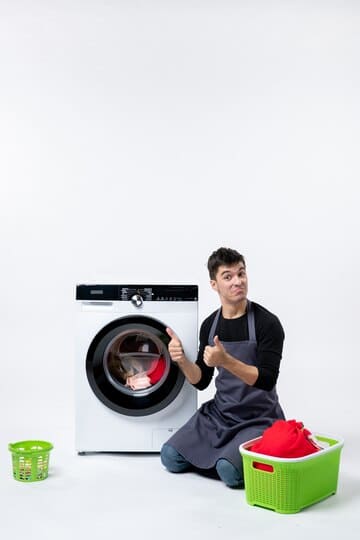When you think of a dirty washing machine it may seem like a contradiction in terms. After all, that is a household appliance made for washing and keeping our clothes clean and fresh. However, sometimes, that very machine, responsible for your laundry’s cleanliness can begin to emit an unpleasant odor – a mildewy, unwelcome scent that can even transfer onto your freshly laundered clothes.
So, before jumping to the conclusion that your trusty washing machine needs professional intervention for leaks or other malfunctions, consider rolling up your sleeves, and embark on a mission to rescue your washing machine from its foul-smelling fate.
In this blog, we’ll guide you through the steps to give your machine the TLC it deserves and ensure your laundry stays filled with the comforting fragrance you expect.
What Causes a Smelly Washing Machine?

Your washing machine, even though it’s filled with clean water and detergent, is also brimming with the accumulated sweat and grime coming from your clothes and towels. The primary causes of washing machine odors are mold, mildew, and bacteria. With the humidity that lingers in and around your washing machine, these unwelcome guests unfortunately often find their breeding ground there.
However, sometimes the source of the stench can also be a pipe or sewage. If the odor persists even after deep cleaning, you may need to call a plumber to investigate.
Smelly Washing Machine Drum
A smelly washing machine drum is an unpleasant issue for your laundry routine. The root of the problem is usually found in mold buildup, mildew, or bacteria. These disgusting microorganisms thrive in warm and damp environments which often happens to be a washing machine drum, especially if wet clothes stay sitting there for long periods of time.
Besides, if you mostly use low-temperature washing cycles, that can give rise to bacteria and mold growth problems. An excess of detergent can also accumulate in the washing machine drum and contribute to odor issues.
Smelly Washing Machine Drain
A smelly washing machine drain brings an equally unpleasant experience. Understanding the causes behind the odor will bring you closer to a solution. Typically, a buildup of bacteria and mold in the drains causes the problem. Sometimes, a partially blocked or clogged drain can cause or worsen the issue, making stagnant water accumulate and further contribute to foul odors.
To tackle the issue effectively, it’s important to address the cleanliness of the drains, as well as to ensure unobstructed water flow, to avoid the buildup of dirt and mold.
Smelly Washing Machine Top Loader – How to Fix It?
The truth is that washing machines endure a lot. Soap scum, hair, dirt, and body oils love to remain in the nooks and crannies of gaskets, seals, and dispensers. Over time, this unsavory cocktail of substances accumulates and supports the appearance of unpleasant odors.
So, how to fix the issue of a smelly washing machine top loader? Removing the foul odor from it may be simpler than you think. Here are some simple steps to help you out:
Gather the ingredients
For cleaning the smelly washing machine you don’t need special cleaners or strong chemicals. Just grab some baking soda and white vinegar, and you will be ready for this cleaning project.
Empty the washing machine drum
Before you begin, make sure your washing machine is completely empty.
Make the baking soda solution
Combine ¼ cup of baking soda and the same amount of water to make a paste. Mix the ingredients in a small bowl, and add it directly to the drum of your top-loader.
Use vinegar
Add 4 cups of white vinegar to the drum. That should work well with the amount of water that top-loaders usually use.
Run a full cycle
Set the washing machine to its highest temperature cycle and let it run as usual. The combination of baking soda and vinegar will work its magic to banish those annoying odors from your washer.
Wipe the drum
After the washing cycle is completed, take a damp sponge or a cloth and wipe down the drum. This final action will help you eliminate any lingering scent of the vinegar you used for cleaning.
Smelly Washing Machine Front Loader – How to Fix It?

Front loaders can often get more stinky as the rubber gasket around the door, which is essential for preventing leaks, also traps moisture, creating a perfect breeding ground for mold and mildew.
Besides, front-loading washing machines are designed to be high-efficiency (HE), using less water than the top-loading ones. While that is great for the environment and your water consumption, it can lead to a detergent residue accumulation as there often isn’t enough water to rinse it thoroughly. Standard detergents leave a residue that attracts dirt and debris, forming a gunky, smelly buildup.
To fix this issue and clean your front-loader, follow the similar steps as listed for the top-loading washing machines. Start by running an empty washing cycle at high temperatures and add two cups of white vinegar. Front-loaders use less water, so two cups of vinegar will be perfectly enough to disinfect and break down the smelly dirt residue.
Follow up with a second washing cycle where you will put baking soda paste in the drum, or in the detergent drawer. Wiping down the rubber door gasket with a cloth soaked in vinegar is also a good idea, and it will remove bacteria and mold.
Finally, leave the washing machine door open or ajar after each use and let it dry properly. A proper airflow will help a lot with preventing mold and odors.
What Is the Best Smelly Washing Machine Home Remedy?
The best way to clean a smelly washing machine lies in simple home remedies. You don’t need a professional cleaning service in Dallas to make the cleaning of your washing machine your regular bathroom maintenance routine. After trying the very basic home remedy cleaners, you will never have to deal with a bad-smelling washing machine again.
Our first piece of advice is – prevention. Regularly clean your washing machine, and leave its door ajar after every use, so it can dry properly. However, if it’s already too late for that, we suggest you go for natural disinfectants such as baking soda and vinegar.
Smelly washing machine vinegar
Vinegar is a natural disinfectant that can work wonders for your washing machine. Its acidity helps dissolve detergent residue scum, bacteria, and mineral deposits, while also neutralizing unpleasant odors.
To use it effectively, pour two cups of white vinegar into an empty machine and run a hot water cycle. This process not only disinfects your washing machine but also prevents mold and mildew buildup. Besides cleaning the washing machine drum and drains, you can use a simple cloth soaked in vinegar to wipe down the detergent drawer and rubber gaskets.
Clothes Coming Out of Washing Machine Smelly – What Could Be the Cause?
If your washing machine has been exposed to mold growth and accumulated bacteria, your clothes can come out of the washing cycle unpleasantly smelly, too. Insufficient rinsing, often caused by using too much detergent or washing in cold water, can also leave soap residue that attracts odors.
Besides, if you often leave your wet laundry trapped in the washing machine for too long after the cycle, it can develop a musty odor, as well.
How Often to Clean Your Washing Machine?
If you rarely think about cleaning your washing machine until it develops an odor, you’re definitely not alone. However, your personal usage should be your guide for how often to clean it.
If you’re not using it too often, a monthly cleaning may be enough. On the other hand, if you’re doing daily loads of laundry, it’s wise to clean your washer weekly to prevent the mold and mildew buildup, and dirt residues that can lead to unpleasant odors.
By adjusting your cleaning routine with your usage, you’ll make sure your washing machine experiences no issues and continues to provide fresh and odor-free laundry.
